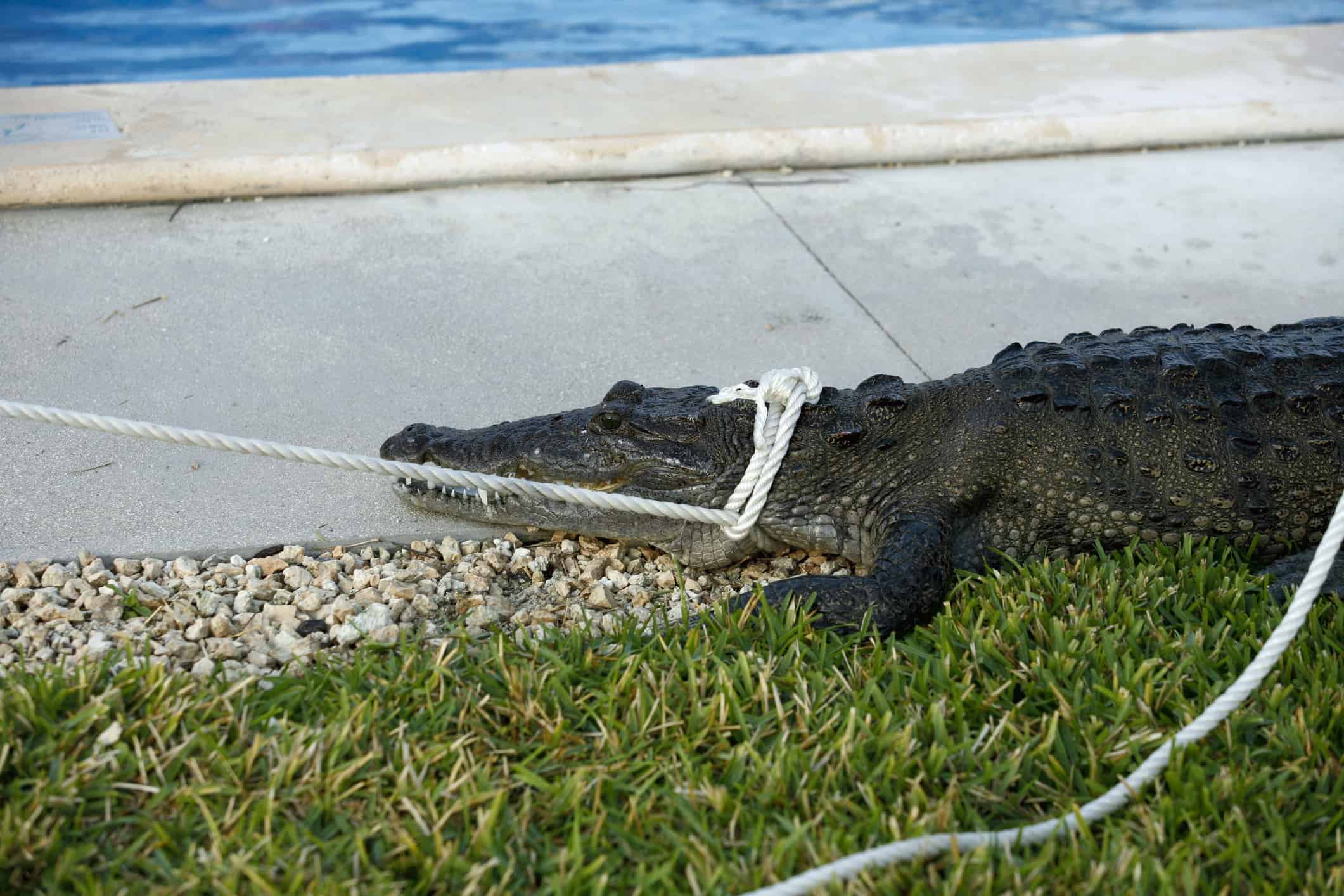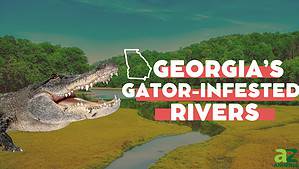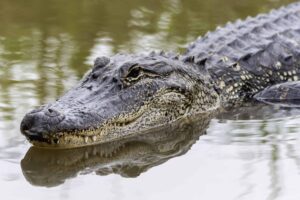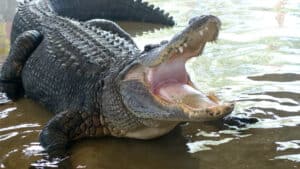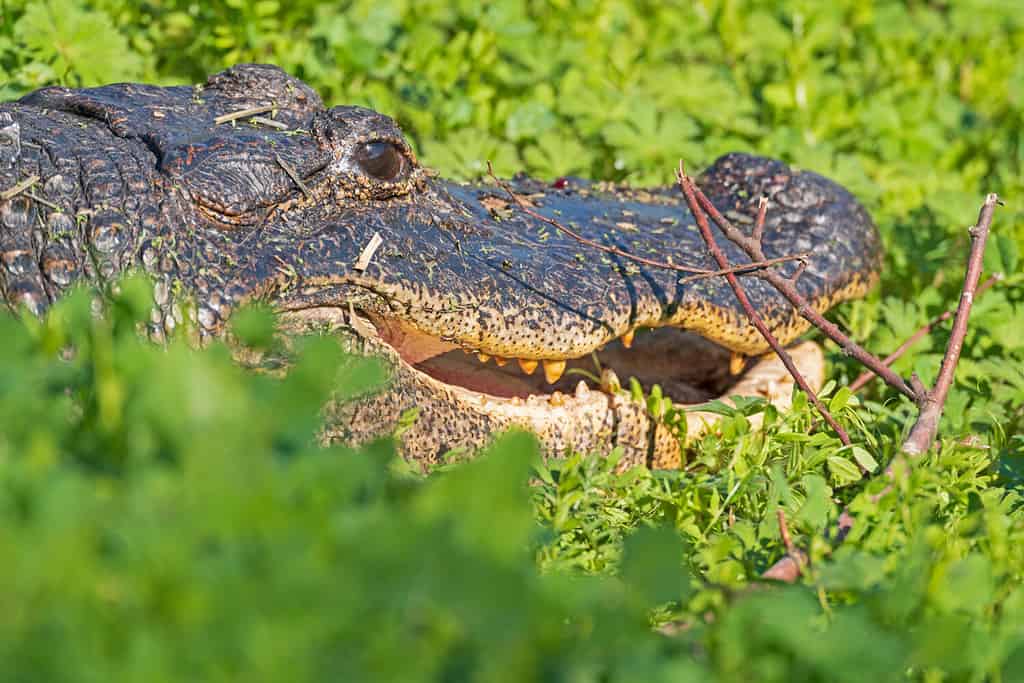
Alligator hunting in Georgia is a sport many in the area participate in when they get the chance.
©Wildnerdpix/Shutterstock.com
So you’ve decided to try out alligator hunting in Georgia. Perhaps you’ve been applying for years and finally earned a permit. Or maybe you’re just thinking about applying and want to make sure you understand what you’re getting into first.
Either way, this article has you covered. It explains the basic rules and regulations, the various zones, and what you need to keep on your person when you’re out hunting.
Keep reading to make sure you understand what is expected of an alligator hunter by Georgia’s Wildlife Resources Division (WRD).
Rules and Regulations
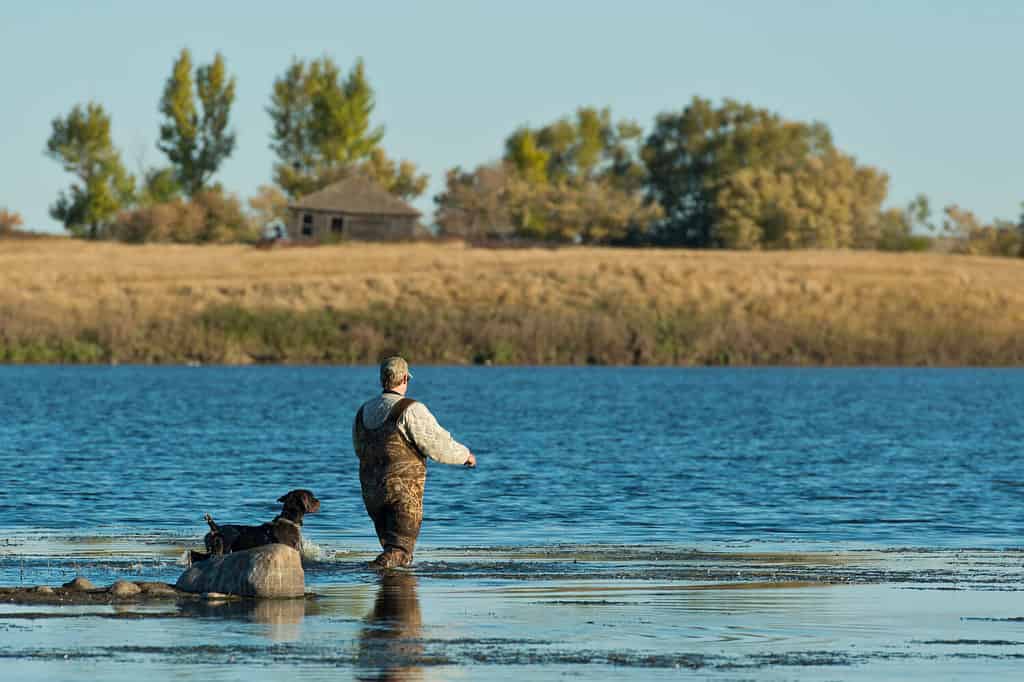
Gator hunting is a little different from other types of hunting, such as ducks or deer.
©Steve Oehlenschlager/Shutterstock.com
Take the time to learn all the rules before you start planning an alligator hunt. While the list below covers the major rules and guidelines, they are not all-encompassing. Make sure you check the rules and regulations provided by Georgia itself to make sure you understand all of the rules and laws.
What You Need
Before you can start hunting, you need to make sure you have everything. First, you will need a quota alligator harvest permit. This costs $75. Replacements for these permits are not provided, so it’s important not to lose them and to keep them in a safe place.
Once you get your permit for the actual hunt, you need to make sure everything else is ready. For one, you need a hunting license. It must be active and on your person any time you are hunting.
If anyone is coming with you, they will also need an active hunting license. It doesn’t matter if they are actively hunting or not. If they are helping to look for the gator, assisting in capture or dispatch, holding a light, or operating the boat, they need a license.
You don’t need an active license to apply for a hunt, so some people forget they still need it for the actual hunt. This is an important step that you don’t want to forget. They can take a longer time to get one during busy hunting seasons, so it’s best to start the process early since the hunting window for gators is so short.
Size
For most zones, the alligator you catch has to be at least 48 inches. The exception is that alligators in Zone 1a need to be at least 96 inches. Other than that, there are no other size requirements.
Number of Tags You Can Get
In Georgia, gator hunting is in high demand. For that reason, only one tag per person or group is provided. It also may take several years before you are provided a tag, and even longer to get a tag in your preferred zone.
Capturing and Dispatch Guidelines
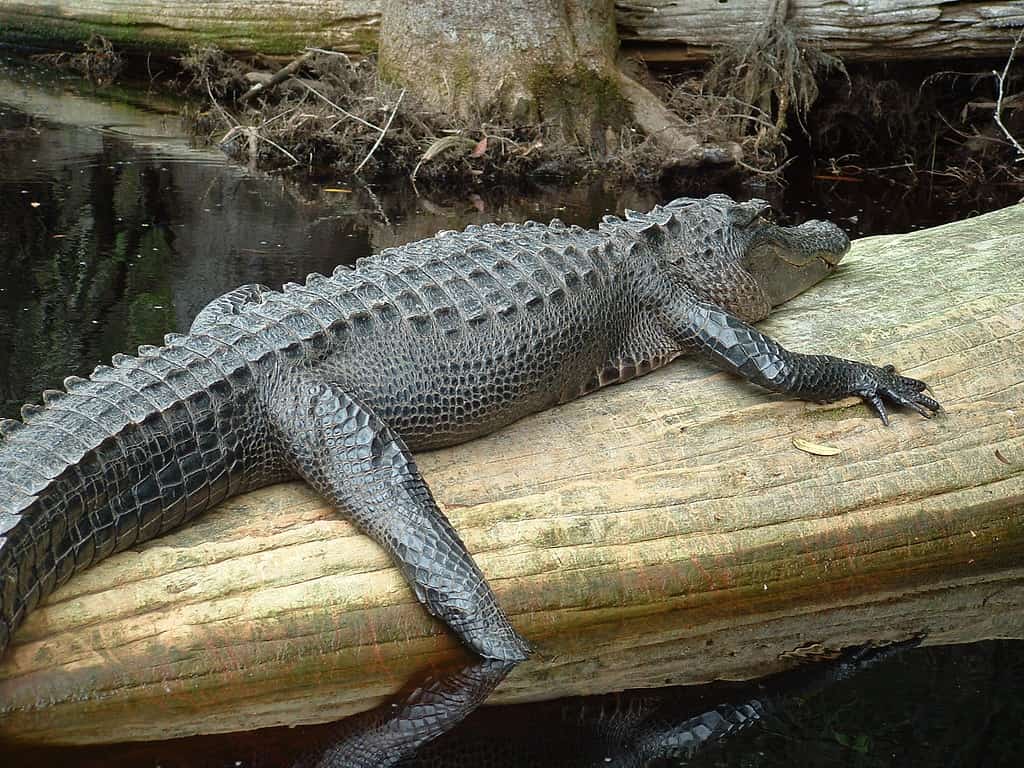
The American alligator was once an endangered species. Now, regular hunting allows the species to stay at ideal population levels.
©Leafyplant at the English Wikipedia, CC BY-SA 3.0 – Original / License
Now that you’re ready to get out on the water, you need to understand what to do when you find your gator.
Capturing Rules
The biggest rule for capturing is that it’s against the law to kill the alligator before capturing it. Only once the gator is caught alive can you proceed to dispatch it.
Capturing involves securing a restraining line. Tools such as snares, harpoons, gigs, arrows, and snatch hooks are all allowed. Which one you use is up to you.
Once the gator is wrangled up next to the boat, a snare should be attached. There are several ways to apply a snare and place them, but that is also up to the hunter.
Dispatch Rules
After your chosen gator is caught and snared and is adjacent to the boat, you are allowed to dispatch it. Any type of bangstick or a handgun of any caliber may be used. The tool should be aimed at the base of the skull. It needs to be angled so it faces forward from the rear of the skull.
While this isn’t necessarily a rule, it is the safest way to dispatch a gator. Shooting in other areas may lead to a gator pretending to be dead, or may even render them temporarily unconscious. This is dangerous as a gator can then wake up later on the boat and injure you and your party.
Additionally, for alligator hunting in Georgia, the only firearms you are allowed to have with you are the ones you’re using to hunt alligators. For further guidelines on dispatch and capture tools, refer to the document provided by Georgia’s Wildlife Department.
Once the alligator is dead, you can start the process of pulling it up onto the boat.
Steps After Harvesting
When you have the gator in your boat, it’s time to start the harvesting and processing steps. For one, you have to attach the tag to the alligator’s tail. It must be within six inches from the tip of the tail. It also needs to stay on the gator at all times until the WRD Game Management Office validates the hunt.
Within 24 hours after harvesting the alligator, you must fill out the permit. This permit, or a copy of it, must stay with the alligator hide at all times until the hunt is verified.
To validate your hunt, you must go to a Game Management Office or one of their supplemental sites. This must be done shortly after the hunting season is over. Specific dates are issued by the Game Management Division.
You can always go and get your gator validated early. Most offices are open during standard working hours (8 am to 4:30 pm) Monday through Friday. Once they validate your gator, you can start the tanning, exporting, or taxidermy mounting, as you see fit.
Tags Given a Year
For any given year, Georgia hands out 1,000 tags. These tags are broken up into nine zones. Each zone gets a different number of tags depending on how many good-sized alligators are in the area and the demand.
Though the exact number of tags changes every year, they generally are similar. You can expect the division of the tags to look something like this:
- Zone 1: 60-70 tags
- Zone 2: 200-300 tags
- Zone 3: 55-65 tags
- Zone 4: 80-90 tags
- Zone 5: 95-105 tags
- Zone 6: 75-85 tags
- Zone 7: 140-160 tags
- Zone 8: 150-170 tags
- Zone 9: 70-90 tags
- Zone 1A: 30 tags
- Zone 8A: 30 tags
Transferring Tags
It isn’t possible to transfer tags to someone else after you get them. If you don’t use your tag, then, you often get less of a chance to be selected for the next year’s hunt as well.
Hunting Season
Hunting season for gators in Georgia is relatively short. The exact dates change, but you can expect it to go from late August, around the 3rd Saturday of the month, to the beginning of October, around the 1st Sunday of the month.
When to Apply for Tags
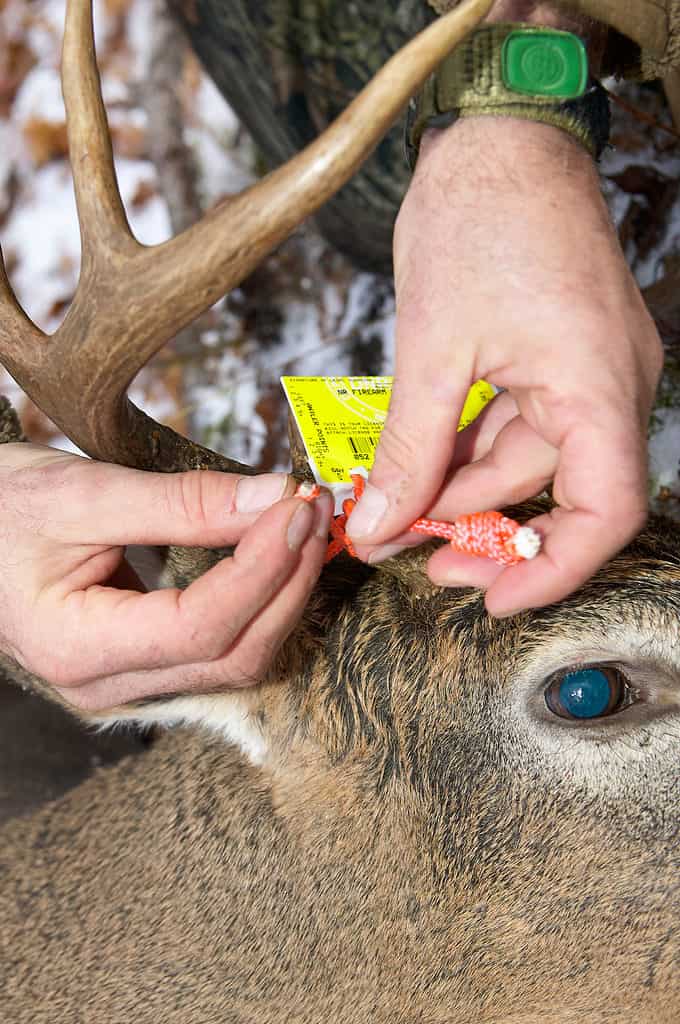
Hunting tags for deer are a little different than for alligators, but the thought is the same.
©CLP Media/Shutterstock.com
People apply for tags up to about a month before hunting season starts. The application usually starts on June 1st. It ends around July 15th.
It can take around four or five years to get a gator tag, especially for your preferred zone. When you apply, you have to choose your top three preferred zones. If you don’t get in those zones, you get a priority point. These points can help you get a higher chance of being chosen for the next year.
Groups can apply for tags, but they are treated as individual applicants. If you decide to use priority points for this application, you are limited to the same number the person with the lowest number of priority points has. Groups are only allowed to have three hunters per application.
Different Hunting Zones
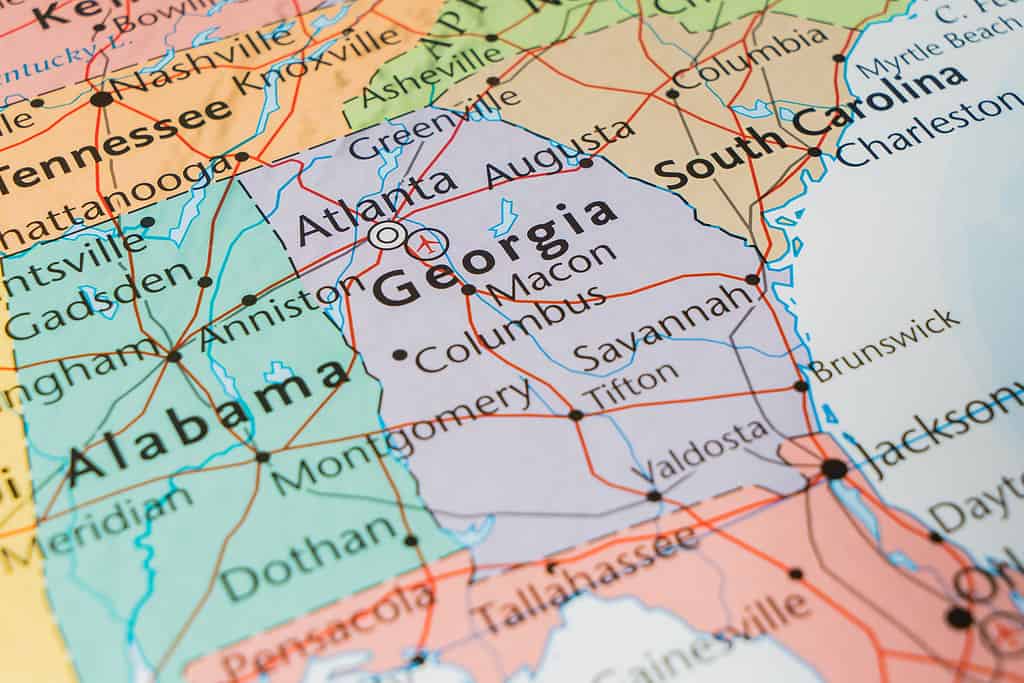
Georgia includes nine zones and two special zones for alligator hunting.
©Alexander Lukatskiy/Shutterstock.com
Not all of Georgia has gator hunting available. Since most gators stay below what’s known as the cold zone, the top part of Georgia doesn’t need to reduce the gator population.
The counties that do offer gator hunting are broken up into nine zones and two special lakes. Each zone gets a certain number of tags per year. When you get a tag for a zone, you’re allowed to search for gators in any part of that zone.
It’s important to understand where zones end and begin so that you ensure you’re always in the right area to do your hunting. The Georgia Department of Natural Resources suggests studying local maps and zoning maps for gators before you start hunting to make sure you’re following the rules. It’s a good way to get a game plan of lakes to visit during your hunt as well.
These zones are specific to gator hunting. They don’t correlate with the wildlife division’s management regions or offices.
Zone 1
Zone one makes up a good portion of the lower west side of the state. Counties in Zone 1 include:
- Harris
- Talbot
- Muscogee
- Chattahoochee
- Marion
- Webster
- Stewert
- Quitman
- Randolph
- Terrell
- Clay
- Calhoun
- Early
Zone 2
Zone 2 is rather small. It includes just six counties in the southwestern chunk of Georgia. This zone includes the following counties:
- Seminole
- Miller
- Baker
- Decatur
- Mitchell
- Grady
Zone 3
The next zone, Zone 3 runs vertically alongside Zone 1. The included counties are:
- Monroe
- Upson
- Crawford
- Taylor
- Schley
- Macon
- Peach
- Houston
- Dooly
- Sumter
- Crisp
- Lee
- Dougherty
- Worth
Zone 4
Zone 4 makes up several counties in the southern-central part of Georgia. You’ll find the following counties in Zone 4:
- Turner
- Irwin
- Tift
- Colquitt
- Cook
- Berrien
- Lanier
- Lowndes
- Brooks
- Thomas
Zone 5
Zone 5 includes a lot of central counties. In Zone 5, there are the following counties:
- Jones
- Baldwin
- Bibb
- Twiggs
- Wilkinson
- Bleckley
- Laurens
- Treutlen
- Montgomery
- Wheeler
- Jeff Davis
- Coffee
- Telfair
- Ben Hill
- Dodge
- Wilcox
- Pulaski
Zone 6
Zone 6 goes back to the south, and is made up of the most southeastern counties. It includes:
- Atkinson
- Clinch
- Echols
- Ware
- Charlton
- Bacon
- Pierce
- Brantley
- Camden
Zone 7
Zone 7 sits just a little above Zone 6. It’s another small section, only having seven counties. The seventh zone is made up of these counties:
- Toombs
- Tattnall
- Appling
- Wayne
- Long
- McIntosh
- Glynn
Zone 8
The next area, Zone 8 is above Zone 7. It also includes seven different counties. In this area, the counties include:
- Candler
- Bulloch
- Evans
- Effingham
- Chatham
- Brya
- Liberty
Zone 9
The last zone is Zone 9. It is a bigger section and makes up the most northeastern area where gator hunting is allowed. The counties in Zone 9 are:
- Emanuel
- Johnson
- Washinton
- Hancock
- Warren
- Glascock
- McDuffie
- Columbia
- Richmond
- Jefferson
- Burke
- Jenkins
- Screven
Zone 1A
Zone 1A is a little unique. It is near Zone 1 but only includes one lake. This is Lake Walter F. George.
Zone 8A
Like Zone 1A, Zone 8A includes only one lake, Fort Stewart. It’s near the center of the eighth zone.
Recommended and Required Gear
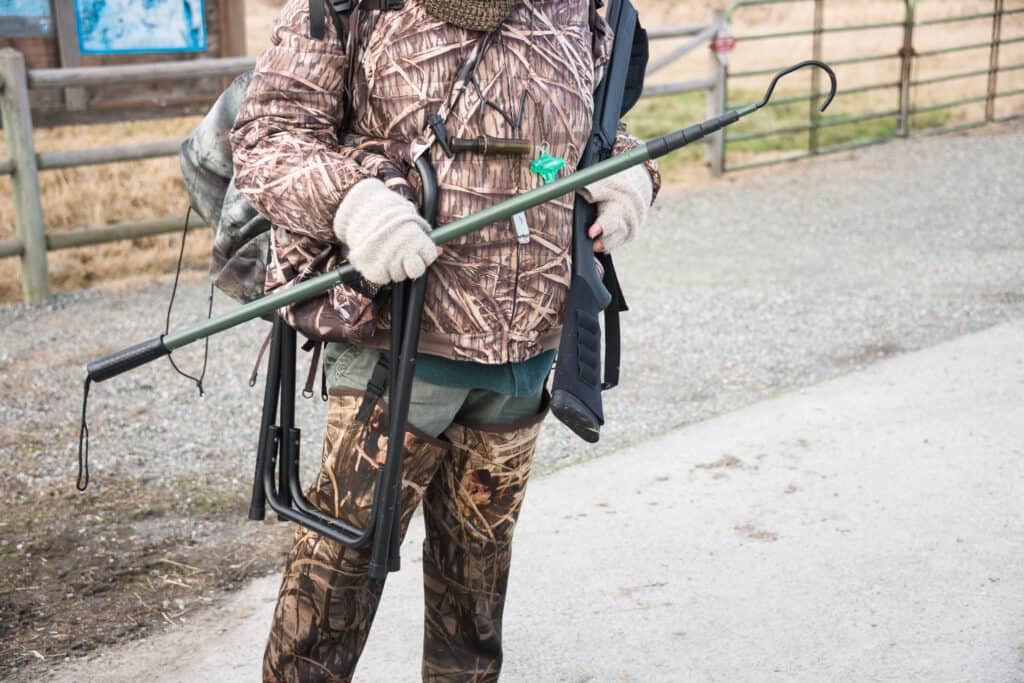
The right gear can make a big difference between a miserable cold, wet, day, or an exciting adventure.
©Denise Lett/Shutterstock.com
For any hunting trip, there’s some gear you need to pack up with you. Some of it is required by the law, some is required to hunt down prey, and some is just highly recommended by experts.
Required
Any time you go on a hunt, there are items you need to bring. The biggest are your harvest permit, hunting license, approval permit, and temporary alligator harvest tag. You will also need written permission from a landowner if you’re hunting on private land.
In addition to all your permits, proper boating equipment is a must. This includes life jackets and running lights. While it’s not required that hunters wear life jackets, it is heavily recommended, and they must still be on the boat.
The next items aren’t required by the law, but they are absolutely necessary if you want to catch and tag a gator. You’ll need capture equipment. There are a few options, and you can pick one based on your preferences including a snare, harpoon, arrow, or gig.
Restraint equipment is also a must for hunters. Usually, this includes at least a snare for the neck and snout. When it comes to actually dispatching the gator, you have the choice between a handgun or a bangstick.
Finally, a knife is necessary. After you catch and dispatch a gator, you need to insert the harvest tag into their tail. You’ll need a sharp knife to insert the tag as gator skin is pretty tough.
Recommended
Other items aren’t necessary but can make life much easier during a hunt. Even before you start hunting, it’s a good idea to understand what your next steps are after catching a gator. The Georgia Department of Natural Resources suggests having processing plans and your next steps already in place.
You may also want to bring a way to keep your gator cool. It can take a long time to get your hunt weighed and measured. You don’t want it to start to rot in that time. A cooler, ice, or some other method to keep it at a low temperature is something you don’t want to overlook.
Finally, consider bringing lights. Your boat will have running lights. A few high-powered lights are a great way to find gators, as their eyes will reflect any light that hits them. It’s also just nice to have a few lights around to see what you’re doing. Consider bringing a few hand-held flashlights for the search, but also have a couple of lights in your boat that you don’t have to hold for the catch and dispatch process as well as hauling the gator into the boat.
Are Guides Necessary?
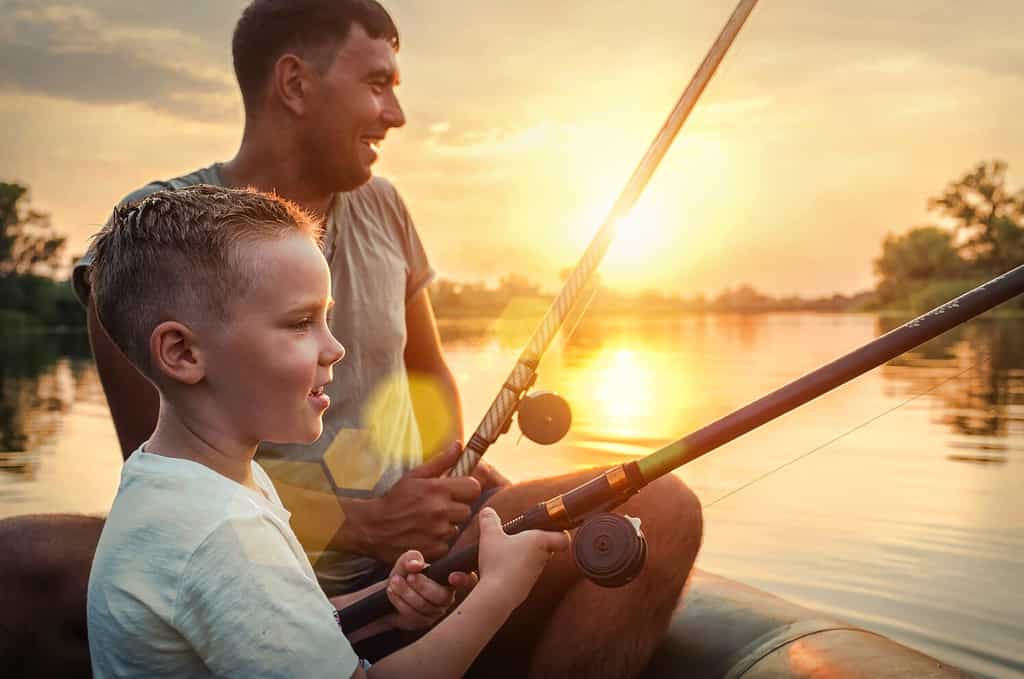
For beginners, a guide may be a good idea to make sure your hunt goes well.
©Andrey Yurlov/Shutterstock.com
Guides aren’t at all necessary. If you have experience hunting, you’re more than welcome to go on your own or with a personal group. However, for beginners, having guides can help you actually catch good-sized gators.
A good guide is also aware of the hunting laws and zones. They’ll make sure everything is being done properly and you’re obeying all of the laws.
Thank you for reading! Have some feedback for us? Contact the AZ Animals editorial team.

